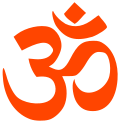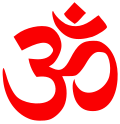The following outline is provided as an overview of and topical guide to Hinduism:
Contents
- General reference
- History
- Prehistoric
- Vedic history
- Denomination
- Vaishnavism
- Shaivism
- Newer movements
- Practices
- Festivals
- Philosophy
- Politics
- Hindu groups and political parties
- Organisations
- Hindu texts
- Vedas
- Upanishads
- Vedangas
- Puranas
- Shastras and Sutras
- Literary texts
- Hindu people
- Freedom fighters
- Social leaders
- Politicians
- Other terms and concepts
- Inter-religious
- Further reading
- References
- External links
Hinduism – predominant and indigenous religious tradition of the Indian subcontinent. [1] Its followers are called Hindus, who refer to it as Sanātana Dharma [2] (Sanskrit : सनातनधर्मः, lit. 'the eternal law that sustains/upholds/surely preserves'), [3] [4] amongst many other expressions. [5] [6] Hinduism has no single founder, and is formed of diverse traditions, [7] including a wide spectrum of laws and prescriptions of "daily morality" based on the notion of karma, dharma, and societal norms. Among its direct roots is the historical Vedic religion of Iron Age India and, as such, Hinduism is often called the "oldest living religion" [8] or the "oldest living major religion" in the world. [9] [10] [11] [12]





